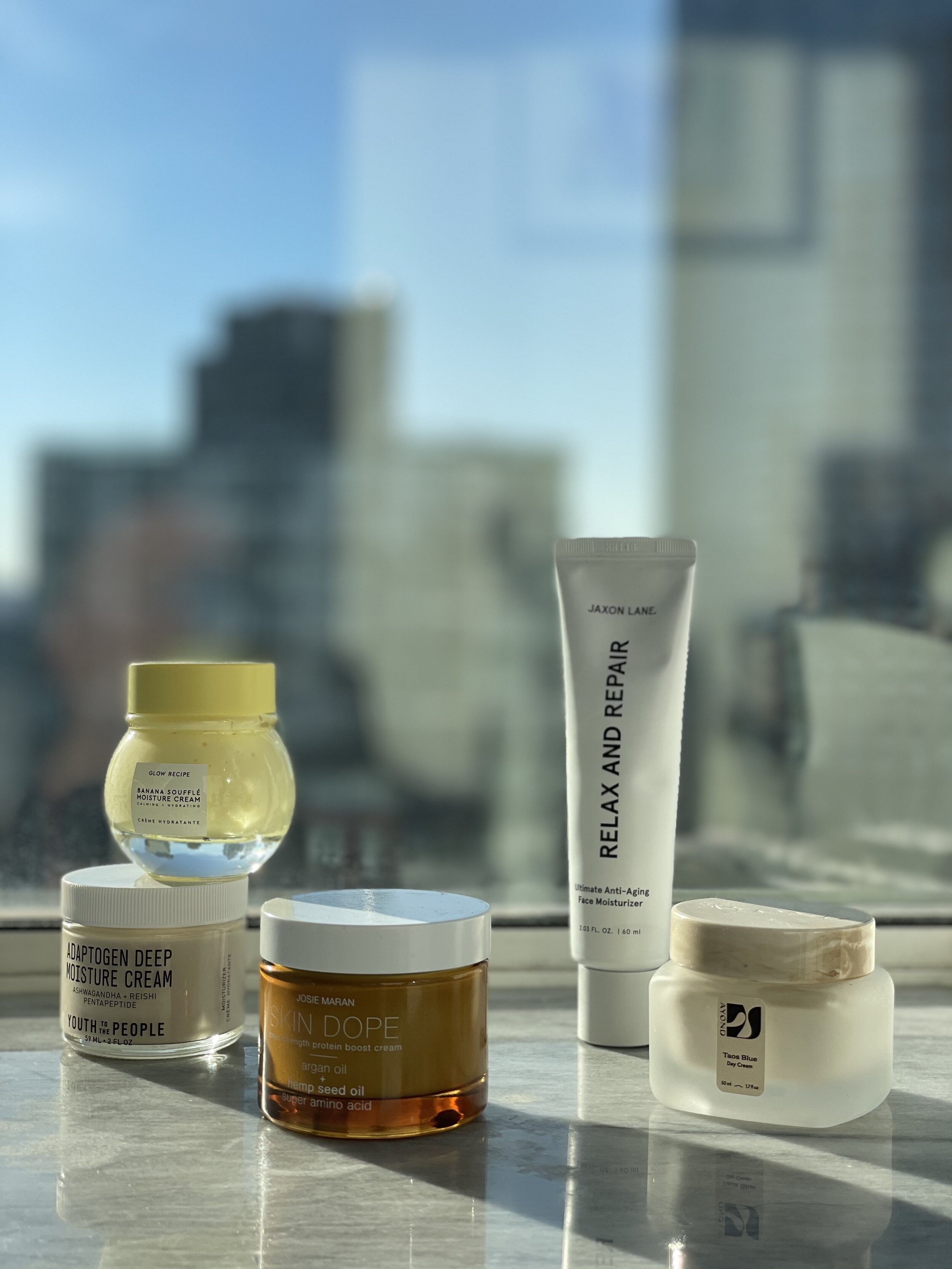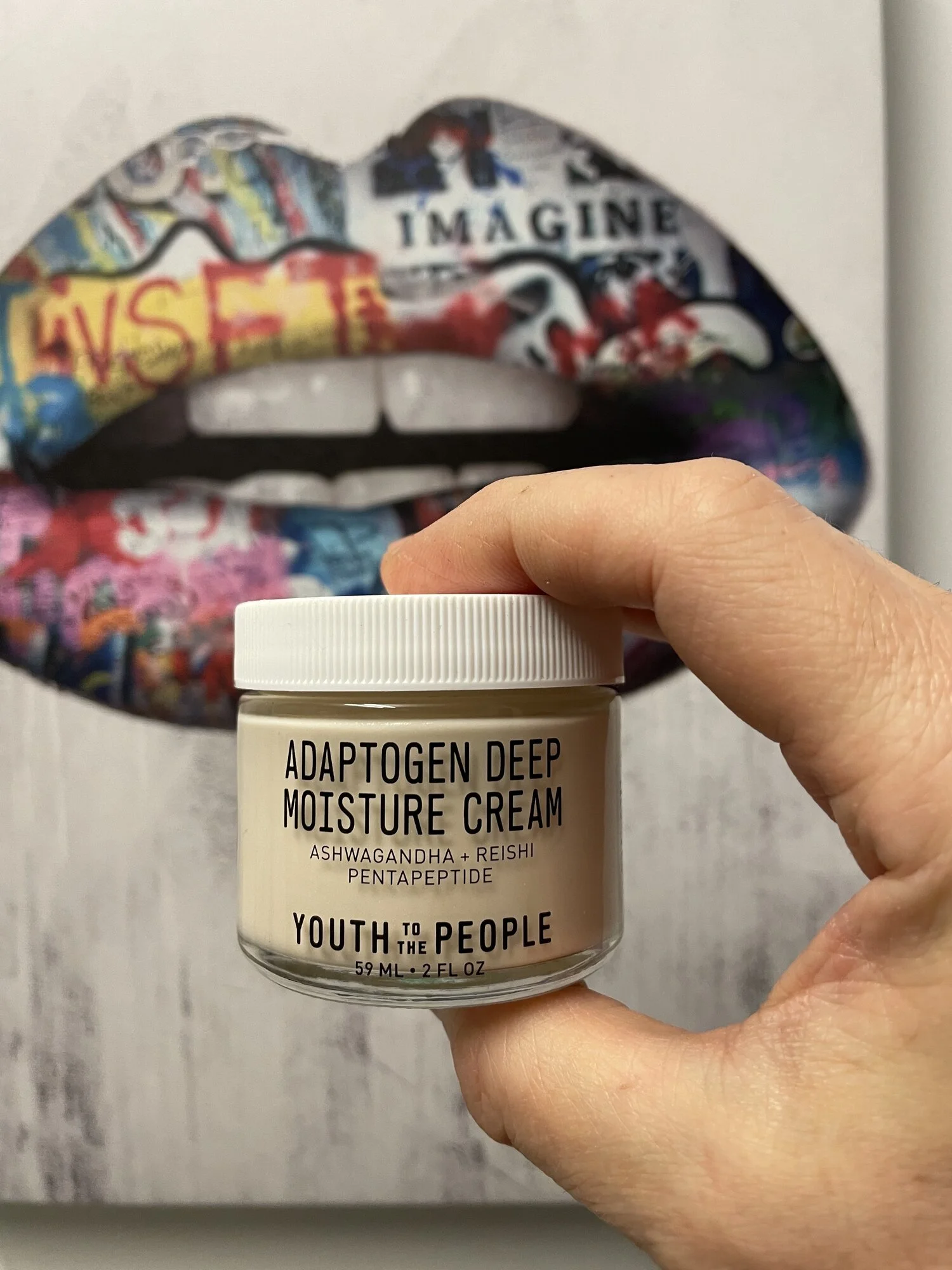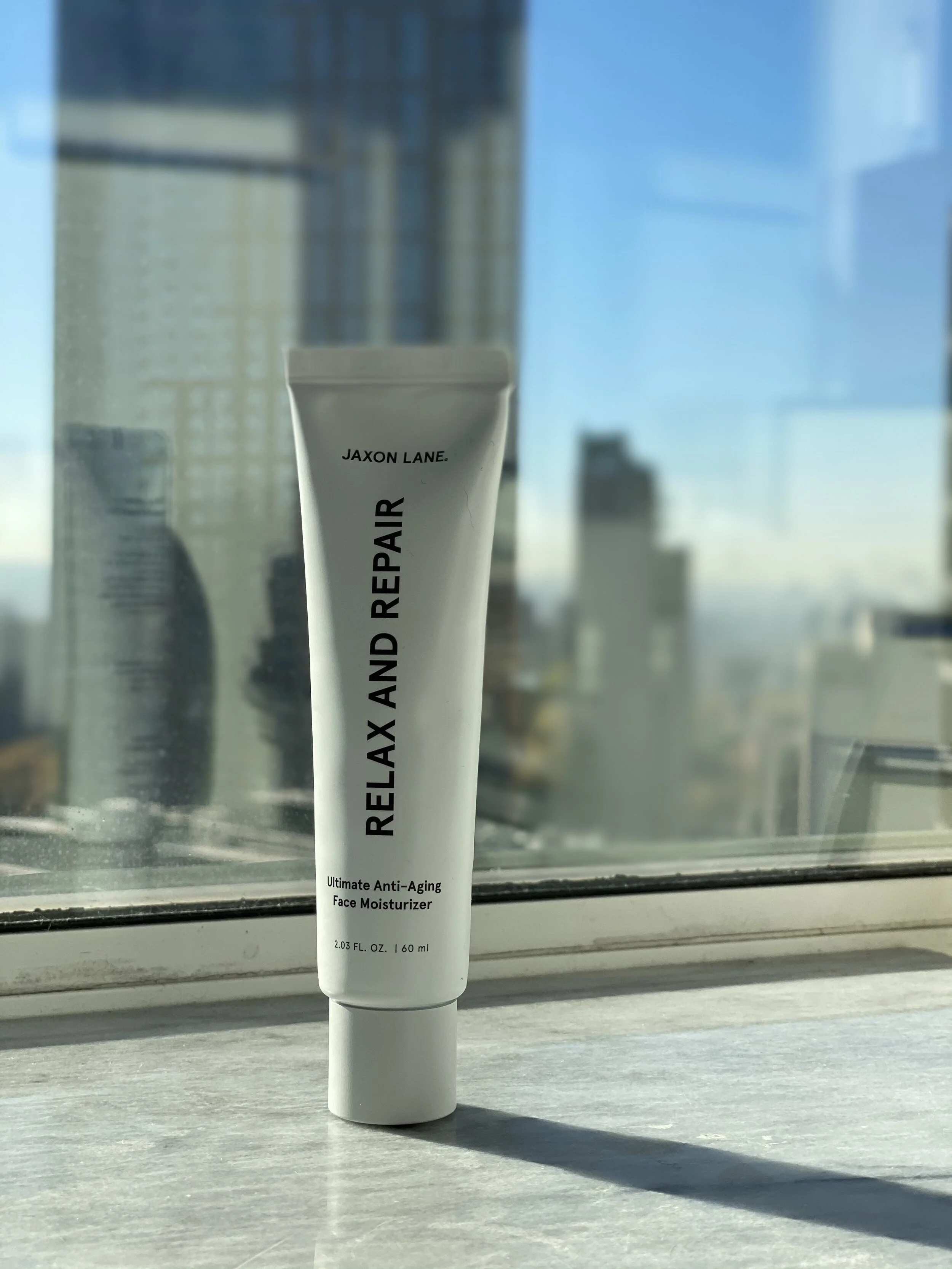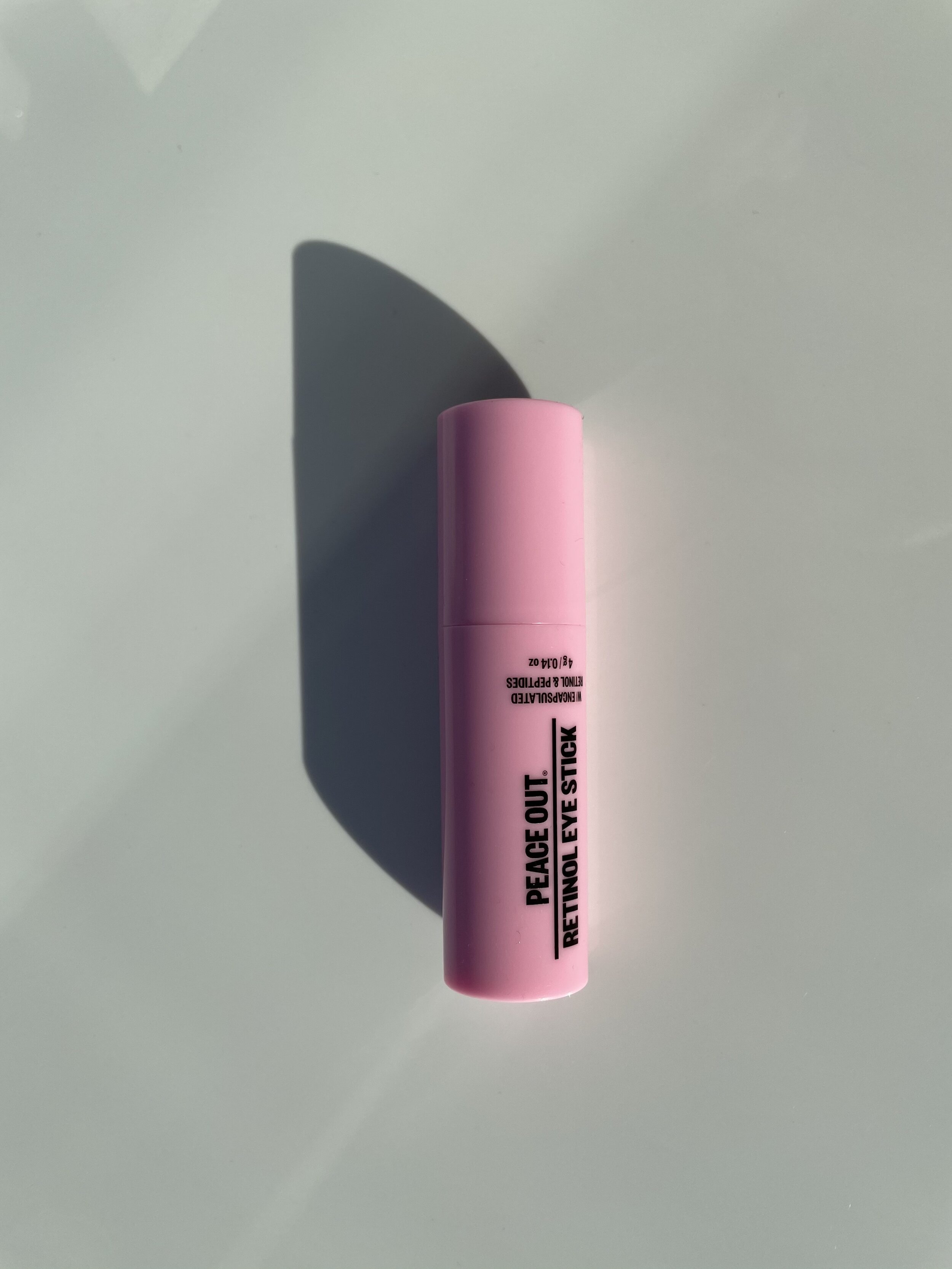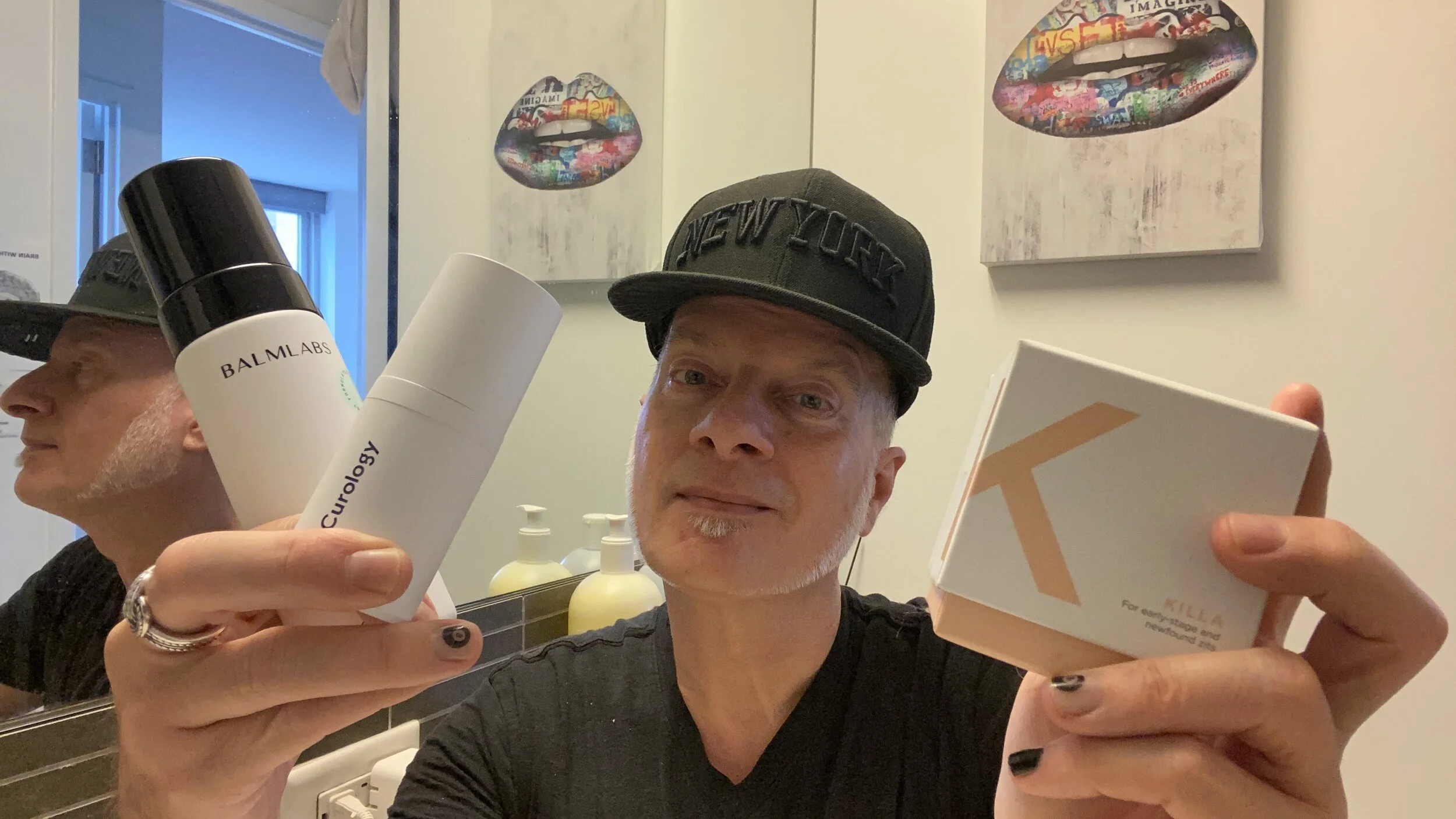PRODUCT REVIEW: PEACE OUT REPAIRING MOISTURIZER – BEST FACE CREAM FOR OILY SKIN, BEST MOISTURIZER FOR BLEMISHES
PEACE OUT | REPAIRING MOISTURIZER
This product review was originally part of my blog article titled, Seasonal Skincare Transitioning: Moisturizers I Love that Make Me Excited for Cold Weather - Part One – Best Hydrating Moisturizers, Best Face Creams for Dry Skin. You can catch the full piece here.
__
As I do each fall, I’m publishing my two-part series of what I consider to be among the best moisturizers for colder weather. That is, face creams ideal for dry, dehydrated skin no matter the skin type. Contrary to commonly held beliefs, even oily skin needs extra moisture during periods of low-humidity. When the air around us is very dry, it drains the water (and the life!) out of our face.
Around this same time last year, I kicked off my FW20 series of my top ten cold weather face creams in a blog article titled, Winter Moisturizers Part I – Some of the Best Face Creams for Dry Skin and All Skin Types in Cold Weather. If you missed it, by chance, you can read it here.
Then, a couple of weeks later, I published Winter Moisturizers Part 2, which you can read here. The second in the series happened to feature two richer face creams that I still love using a year later.
WINTER MOISTURIZERS PART 2 – SOME OF THE BEST FACE CREAMS FOR DRY SKIN AND ALL SKIN TYPES IN COLD WEATHER
The first of the two is Youth to the People’s Adaptogen Deep Moisture Cream. It not only comforts dry, dehydrated skin but it can help calm skin that’s become sensitized and raw from the harsh, cold air. I’ve been there and I know first hand how the cold can compromise the health of your skin.
The Adaptogen Deep Moisture Cream is a rich blend of nourishing and replenishing plant oils, antioxidant botanical extracts and skin-calming adaptogens. Among its moisturizing oils are Sunflower Oil, at ingredient number two, Squalane, Jojoba Seed Oil and Shea Butter. In the cold, that’s exactly what skin needs. But the star actives, as indicated in the product name, are two adaptogens, Ashwagandha Extract and Reishi Mushroom Extract, which can help to calm overactive, stressed-out skin.
PRODUCT REVIEW: YOUTH TO THE PEOPLE ADAPTOGEN DEEP MOISTURE CREAM – BEST MOISTURIZER FOR IRRITATED SKIN
To this day, I consider Youth to the People’s Adaptogen Deep Moisture Cream the best moisturizer with adaptogens to calm irritated skin. There’s nothing else like it.
The second notable stand-out from my FW20 series is the Jaxon Lane’s Relax and Repair moisturizer. The brand behind the popular Bro Mask, the Jaxon Lane Relax and Repair comes in a tube (which I love!) and is infused with beneficial, pro-skin health, anti-aging actives like Niacinamide, Hyaluronic Acid, collagen and ceramides.
It’s one of the best face creams for men — at least one that’s marketed for men. I don’t have much faith in products made for men; skin is skin. And all skin needs the same things — many of them in Jaxon Lane’s fantastic face cream.
PRODUCT REVIEW: JAXON LANE RELAX AND REPAIR – BEST FACE CREAM FOR DRY SKIN, BEST FACE CREAM FOR MEN
What’s the Difference between Dry Skin and Dehydrated Skin?
Many people confuse the two. They’re not the same thing. Dry skin is a skin type. Dehydrated skin is a skin condition, just as being thirsty is a sign that your body is dehydrated. Dehydrated skin lacks water and any skin type, no matter its level of dryness or oiliness can be dehydrated.
In particular, dehydration is something that’s common to all of us in the cold as the low-humidity air around us draws water through the skin barrier and out of our skin. This process is referred to as trans-epidermal water loss, or TEWL. (More on TEWL in my review of the Skinfix Barrier+ Triple Lipid-Boost 360° Eye Cream below.)
As the cold weather kicks in, I think it’s helpful to understand the difference between dry skin and dehydrated skin in order to protect your skin health in the weeks ahead. For insights, I turned to the experts on the Paula’s Choice Research Team. There’s a superb piece on the Paula’s Choice site titled, What is Dehydrated Skin & How to Choose the Best Products.
Here is an excerpt:
Dehydrated skin often looks and feels like dry skin all over your face, but there's a major difference between the two: dehydrated skin is usually a temporary concern (with various surprising causes) and dry skin typically doesn't change over time. If you have dehydrated skin, your skin may also produce a normal or even excessive amount of oil on its surface.
"Dehydrated skin" is something we’re asked about frequently. It seems there’s a lot of confusion about what this skin concern is about. A major part of the confusion is that the term "dehydrated skin" is often used interchangeably with "dry skin" or "combination skin" but they are not the same! Dehydrated skin can occur in all skin types and is not exclusive to those with dry skin or combination skin.
The Difference Between Dry Skin and Dehydrated Skin
Having classically dry skin is easy to recognize. Dry skin frequently feels tight and dry, with no oil anywhere to be seen. This situation rarely fluctuates; skin feels dry all year long. The dryness might get worse depending on the climate, season, or activity, but regardless of those things, without great skin care products, the uncomfortable dry, tight feeling will persist.
As mentioned above, dehydrated skin can look and feel similar, but there’s a major difference: Dehydrated skin tends to come and go, it does not persist.
MY FAVORITE HUMECTANT SERUMS FROM PAULA'S CHOICE, THE INKEY LIST AND MORE - BEST HYALURONIC ACID SERUMS
The Skincarma “Lock and Block” Prevents Dehydration
To start, preventing dehydration in the first place requires drinking enough water. That differs for each of us based on our weight, the foods we eat, and the climate we live in. It’s even more important during colder periods.
A good rule is to drink one ounce of water each day for every pound of body weight. So, if you weigh 150 lbs., you’ll need to drink 150 ounces of water each and every day to keep your body and your skin optimally hydrated.
Then, employing skincare to treat and prevent dehydration requires what I refer to as a “lock and block” strategy.
It begins with a dedicated humectant serum applied to the skin in both your AM and PM routines that helps to lock water in. Follow with a moisturizer composed of a healthy balance of both humectants and oils to block and prevent the trans-epidermal water loss that can lead to dehydration.
WATCH MY VIDEO REVIEW OF
MY FAVORITE HUMECTANT SERUMS FROM PAULA'S CHOICE, THE INKEY LIST, GHOST DEMOCRACY AND MORE
ON MY YOUTUBE CHANNEL HERE
The moisturizers I’ve selected below all deliver a lock and block effect by locking hydration into the skin with humectants and blocking TEWL with effective levels of non-fragrant plant oils and/or lipids — essentially fats in the skin.
Today I’m presenting the first part of my FW21 series on cold weather face creams, a collection that includes some of the best moisturizers for combatting dry, dehydrated skin — no matter the skin type.
This year, I’ve selected four distinct moisturizers and designated the unique skin type that I believe it’s best for — one in each of the main categories. In the title, you’ll see new designations for DRY SKIN, OILY / BLEMISH PRONE SKIN, SENSITIVE SKIN and ALL SKIN TYPES.
Additionally, at the end of each review, you’ll find a new section that breaks down what I like and don’t about the product as well as a deeper explanation of who I think it’s best for based on the formula make-up, texture and my own experience with it.
Among my selections in part one below is a face cream that I featured on the blog several times throughout 2020, the Skinfix Barrier+ Triple Lipid-Peptide Face Cream. It’s a really smart, well-formulated product and simply among the best face creams for dry skin. In the last year, Triple Lipid-Peptide Face Cream, or TLPC for short, has catapulted to the top of Sephora’s nearly endless collection of moisturizers. As I write this, it’s the number one face cream in the moisturizer category on the Sephora website.
Peace Out’s Repairing Moisturizer is formulated specifically for oily and blemish prone skin year-round, but I found it worked great on my own skin throughout much of the year and I’ve been eager to share it.
My favorite skincare brand for sensitive skin, First Aid Beauty introduced its rich, luxurious, thick-whipped Ultra Repair Firming Collagen Cream several months ago. If you have dry, sensitive skin, this one is for you.
One of my favorite brand experiences of 2021, Replenix offers clinical skincare formulated with what the brand describes as “medical grade ingredients”. And the brand’s Glycolic Acid 20% Resurfacing Cream is exceptional. With a 20% Glycolic Acid complex, I was terrified to use it at first; I’m now a convert.
I’m also including one of my favorite eye creams, the Skinfix Barrier+ Triple Lipid-Boost 360° Eye Cream. It’s one which I think every skin type can and will benefit from.
Let’s have a look at one of the FW21 face creams that I consider ideal for oily and blemish prone skin in cold weather…
BEST FOR OILY / BLEMISH-PRONE SKIN:
Peace Out | Repairing Moisturizer
Though the brand has been popular for a while now, I only first began exploring Peace Out this past year. It’s really a consequence of the fact that until recently, the brand only offered a single product — their popular acne patches. I believe they’ve undergone a slight name change but the Peace Out Salicylic Acid Acne Healing Dots appear to be the original formula.
Funny, I’ve never tried them to this day. But I have tried the brand’s Retinol Eye Stick and even included it in my two-part series last year on all-things Retinol titled, Retinol, Retinoids, Retinoic Acid: Best Retinol Serums, Best Retinol Creams from Paula's Choice, Wander Beauty and First Aid Beauty. You can still catch the full piece here.
PRODUCT REVIEW: PEACE OUT RETINOL EYE STICK - BEST RETINOL EYE CREAM, BEST EYE CREAM WITH RETINOL
Peace Out’s Retinol Eye Stick is fun, convenient and is actually a serious Retinol treatment. Its star active is Encapsulated Retinol, something you want when using Retinol in the eye area. Encapsulation assures a slow release of the anti-aging, anti-wrinkle powerhouse to mitigate the irritating effects common to Retinol. I know I’m scared to use Retinol, let alone around my eyes!
The brand is truly a leading innovator. So when Peace Out introduced their Repairing Moisturizer I knew it was going to be a cool product.
The first thing I want to say about the new Peace Out Repairing Moisturizer is that I’m intrigued by its unexpected texture. I was expecting a gel-cream from the perky, peachy bottle. Gel creams are easily dispensed and the most common category of moisturizers for oily, acne-prone skin. So, Peace Out surprised me again. The Repairing Moisturizer is best described as more of a dense lotion, if that makes any sense at all.
Peace Out describes their first-ever face cream as, “a lightweight, alcohol-free moisturizer made with sensitive and blemish-prone skin in mind to visibly replenish, refine, and boost your moisture barrier.”
What I appreciate most about it is that the brand looked at what all skins need first and only then addressed the unique needs of an oily or acne-prone skin type. All human skin, regardless of its characterization around dryness or oiliness, needs lipids, antioxidants, humectants and oil-based moisture.
Like the Skinfix Barrier+ Triple Lipid-Peptide Face Cream, the Peace Out Repairing Moisturizer is first and foremost a skin barrier repair treatment. I have honestly never seen a face cream targeted toward oily skin focused on barrier repair. It’s genius and breaks free of skincare marketing conventions, something I have great admiration for.
What Is the Skin Barrier and How Does the Skin Barrier Work?
There’s a superb article on the skin barrier on the Healthline website titled, What to Know About Your Skin Barrier and How to Protect It.
A brief excerpt:
What’s your skin barrier and what purpose does it serve?
Your skin is made up of layers, each of which performs important functions in protecting your body.
The outermost layer, called the stratum corneum is often described as a brick wall. It consists of tough skin cells called corneocytes that are bound together by mortar-like lipids. This is your skin barrier.
Inside the skin cells, or “bricks,” you’ll find keratin and natural moisturizers. The lipid layer contains cholesterol, fatty acids, and ceramides.
This fantastically thin brick wall is literally keeping you alive. Without it, all sorts of harmful environmental toxins and pathogens could penetrate your skin and wreak havoc in your body.
Additionally, without your skin barrier, the water inside your body would escape and evaporate, leaving you completely dehydrated.
Your skin barrier is essential for good health and needs to be protected in order to function properly.
You can (and should!) read more about the importance of your skin barrier here.
Peace Out’s Repairing Moisturizer is really well-formulated with a healthy amount of rehydrating humectant Glycerin to prevent trans-epidermal water loss. There are also two super anti-aging antioxidants in the form of Bakuchiol and Niacinamide in the top ten. My guess is that they’re at concentrations of about 2-3%.
And, as I said, the brand didn’t shy away from what all skins need, despite the formula’s target of oily and acne-prone skin. There are multiple non-fragrant plant oils in the Repairing Moisturizer formula, including Squalane, Hemp Seed Oil, Passionfruit Seed Oil, and Rosehip Seed Oil — one of the best anti-aging oils for face.
A small amount of the natural BHA Willow Bark Extract pairs with the Niacinamide to help keep pores clear while a healthy dose of lipids in the form of ceramides and cholesterol help to replenish and maintain skin’s lipid content.
What I like about it: The Peace Out Repairing Moisturizer is such a terrific formula for protecting skin barrier health. It’s such a smart, innovative formula.
What I don’t like about it: While I get that Peace Out as a brand was founded on targeting products for acne-prone skin, I think this face cream is kinda mis-targeted. While it’s great for oily and acne-prone skin, I think it’s equally ideal for all skin types except perhaps those very dry skins that would need a whole lot more in the way of oil-based moisture.
Who it’s for: Predominantly oily and acne-prone skin types, but pretty much a great face cream for everyone.
SHOP THE BLOG: Purchase the Peace Out Repairing Moisturizer for $28 here.
The Best Acne Treatments
WATCH MY VIDEO REVIEW OF
MY WINTER SKIN SAVIOR: SKINFIX BARRIER+ LIPID REPLENISHING SKINCARE
ON MY YOUTUBE CHANNEL HERE
WATCH MY VIDEO REVIEW
HOW’S YOUR MICROBIOME DOING? THE BEST WAY TO CHECK YOUR MICROBIOME HEALTH…
ON MY YOUTUBE CHANNEL HERE
WATCH MY VIDEO REVIEW
A COMPLETE K-BEAUTY ROUTINE WITH THE BEST FACIAL SKINCARE FROM PURITO, COSRX, MISSHA & MORE!
ON MY YOUTUBE CHANNEL HERE
WATCH MY VIDEO REVIEW
RETINOL, RETINOIDS, RETINOIC ACID PART ONE - THE BEST RETINOL FACE CREAMS & SERUMS
ON MY YOUTUBE CHANNEL HERE
WATCH MY VIDEO REVIEW OF
MY WINTER SKIN SAVIOR: SKINFIX BARRIER+ LIPID REPLENISHING SKINCARE
ON MY YOUTUBE CHANNEL HERE
SKINCARMA X HERBAL FACE FOOD EXCLUSIVE!
FOR A LIMITED TIME, SAVE 20% OFF HERBAL FACE FOOD!
Enter code SKINCARMA20 at checkout.
WATCH MY VIDEO REVIEW
THE YEAR’S BEST VITAMIN C SERUMS WITH THE ORDINARY, CLINIQUE, BEAUTY STAT & MORE!
ON MY YOUTUBE CHANNEL HERE
WATCH MY VIDEO REVIEW
AMPERNA PROBIOTIC SKINCARE AND TWO OF THE BEST ANTI-AGING SERUMS FOR SENSITIVE SKIN
ON MY YOUTUBE CHANNEL HERE
WATCH MY VIDEO REVIEW
MY #SELFCARESUNDAY ESSENTIALS WITH SKINFIX, HERBIVORE AND SELFLESS!
ON MY YOUTUBE CHANNEL HERE
The Ingredient List of the Skinfix Barrier+ Triple Lipid-Peptide Face Cream:
 sii|h 0 0, Olus Oil (Vegetable Oil) emo, Butyrospermum Parkii (Shea) Butter Extract, Cetyl Lactate emo, Propanediol solv|h, Caprylyl Caprylate/Caprate emo, C12-16 Alcohols emo|vc, Jojoba Oil/Macadamia Seed Oil Esters, Glyceryl Stearate Citrate emo|emu, Palmitic Acid sii|emo|emu 0 2, Hydrogenated Lecithin
sii|h 0 0, Olus Oil (Vegetable Oil) emo, Butyrospermum Parkii (Shea) Butter Extract, Cetyl Lactate emo, Propanediol solv|h, Caprylyl Caprylate/Caprate emo, C12-16 Alcohols emo|vc, Jojoba Oil/Macadamia Seed Oil Esters, Glyceryl Stearate Citrate emo|emu, Palmitic Acid sii|emo|emu 0 2, Hydrogenated Lecithin  emo|emu, Ophiopogon Japonicus Root Extract, Tocopherol
emo|emu, Ophiopogon Japonicus Root Extract, Tocopherol  aox 0-3 0-3, Sodium Hyaluronate
aox 0-3 0-3, Sodium Hyaluronate  sii|h 0 0, Rosmarinus Officinalis (Rosemary) Leaf Extract
sii|h 0 0, Rosmarinus Officinalis (Rosemary) Leaf Extract  aox|so|amic, Helianthus Annuus (Sunflower) Extract
aox|so|amic, Helianthus Annuus (Sunflower) Extract  so|emo, Phytosteryl Macadamiate, Phytosterols, Squalene
so|emo, Phytosteryl Macadamiate, Phytosterols, Squalene  sii|aox|emo, Aloe Barbadensis Leaf Juice
sii|aox|emo, Aloe Barbadensis Leaf Juice  so|h, Oryza Sativa (Rice) Bran Extract, Phytosteryl Canola Glycerides, Glycine Soja (Soybean) Seed Extract
so|h, Oryza Sativa (Rice) Bran Extract, Phytosteryl Canola Glycerides, Glycine Soja (Soybean) Seed Extract  aox|sb|so|emo, Pentylene Glycol solv|h, Hydrolyzed Rice Protein, Hydrogenated Vegetable Oil emo 0 3, Chondrus Crispus Extract
aox|sb|so|emo, Pentylene Glycol solv|h, Hydrolyzed Rice Protein, Hydrogenated Vegetable Oil emo 0 3, Chondrus Crispus Extract  h|vc, Dilinoleic Acid/Propanediol Copolymer emo|vc, Ethylhexylglycerin pres, Phenoxyethanol pres, Potassium Sorbate pres, Trisodium Ethylenediamine Disuccinate chel, Citric Acid buff, Gluconolactone
h|vc, Dilinoleic Acid/Propanediol Copolymer emo|vc, Ethylhexylglycerin pres, Phenoxyethanol pres, Potassium Sorbate pres, Trisodium Ethylenediamine Disuccinate chel, Citric Acid buff, Gluconolactone  exf|chel, Sodium Benzoate pres, Xanthan Gum vc
exf|chel, Sodium Benzoate pres, Xanthan Gum vcThe Ingredient List of the Peace Out Repairing Moisturizer:
 sii|h 0 0, Propanediol solv|h, Coconut Alkanes emo|solv, Triheptanoin emo, Brassica Glycerides emo, Cetearyl Olivate
sii|h 0 0, Propanediol solv|h, Coconut Alkanes emo|solv, Triheptanoin emo, Brassica Glycerides emo, Cetearyl Olivate  emu, Coco-Caprylate/Caprate emo, Hydrogenated Ethylhexyl Olivate emo, Sorbitan Olivate
emu, Coco-Caprylate/Caprate emo, Hydrogenated Ethylhexyl Olivate emo, Sorbitan Olivate  emu, Bakuchiol
emu, Bakuchiol  cci|aox|amic, Niacinamide
cci|aox|amic, Niacinamide  cci|sb|aacne|h, Polymethylsilsesquioxane/Silica Crosspolymer, Squalane
cci|sb|aacne|h, Polymethylsilsesquioxane/Silica Crosspolymer, Squalane  sii|emo 0 1, Ceramide EOP
sii|emo 0 1, Ceramide EOP  sii, Ceramide NP
sii, Ceramide NP  sii, Ceramide AP
sii, Ceramide AP  sii, Ubiquinone
sii, Ubiquinone  aox, Cannabis Sativa (Hemp) Seed Oil emo, Passiflora Edulis (Passionfruit) Seed Oil
aox, Cannabis Sativa (Hemp) Seed Oil emo, Passiflora Edulis (Passionfruit) Seed Oil  emo, Moringa Oleifera (Moringa) Seed Oil
emo, Moringa Oleifera (Moringa) Seed Oil  emo, Rosa Canina (Rosehip) Seed Oil
emo, Rosa Canina (Rosehip) Seed Oil  emo, Pavlova Lutheri Extract, Salix Alba (Willow) Bark Extract
emo, Pavlova Lutheri Extract, Salix Alba (Willow) Bark Extract  so, Cholesterol
so, Cholesterol  sii|emo 0 0, Lauroyl Lysine vc, Phytosphingosine
sii|emo 0 0, Lauroyl Lysine vc, Phytosphingosine  sii|cci|aacne|amic, Saccharomyces Ferment
sii|cci|aacne|amic, Saccharomyces Ferment  , Castor Oil/Ipdi Copolymer, Sodium Lauroyl Lactylate emu, Caprylhydroxamic Acid chel, Dilinoleic Acid/Butanediol Copolymer, Trisodium Ethylenediamine Disuccinate chel, C12-15 Alkyl Benzoate emo|amic, Citric Acid buff, Tocopheryl Acetate aox 0 0, Carbomer vc 0 1, 1,2-Hexanediol solv, Hydroxyethyl Acrylate/Sodium Acryloyldimethyl Taurate Copolymer vc, Ethylhexylglycerin pres, Polysorbate 60 emu|surf, Sorbitan Isostearate emu 0 1-2, Phenoxyethanol pres
, Castor Oil/Ipdi Copolymer, Sodium Lauroyl Lactylate emu, Caprylhydroxamic Acid chel, Dilinoleic Acid/Butanediol Copolymer, Trisodium Ethylenediamine Disuccinate chel, C12-15 Alkyl Benzoate emo|amic, Citric Acid buff, Tocopheryl Acetate aox 0 0, Carbomer vc 0 1, 1,2-Hexanediol solv, Hydroxyethyl Acrylate/Sodium Acryloyldimethyl Taurate Copolymer vc, Ethylhexylglycerin pres, Polysorbate 60 emu|surf, Sorbitan Isostearate emu 0 1-2, Phenoxyethanol presThe Ingredient List of the First Aid Beauty Ultra Repair Firming Collagen Cream:
 sii|h 0 0, Niacinamide
sii|h 0 0, Niacinamide  cci|sb|aacne|h, C12-15 Alkyl Benzoate emo|amic, Caprylic/Capric Triglyceride emo, Glyceryl Stearate SE emu 2 3, Glyceryl Stearate emo|emu 0 1-2, Dimethicone emo 0 1, Cetearyl Alcohol emo|vc|emu|surf 1 2, Panthenol
cci|sb|aacne|h, C12-15 Alkyl Benzoate emo|amic, Caprylic/Capric Triglyceride emo, Glyceryl Stearate SE emu 2 3, Glyceryl Stearate emo|emu 0 1-2, Dimethicone emo 0 1, Cetearyl Alcohol emo|vc|emu|surf 1 2, Panthenol  so|h 0 0, Colloidal Oatmeal
so|h 0 0, Colloidal Oatmeal  so|aox|emo|abrasive/scrub, Squalane
so|aox|emo|abrasive/scrub, Squalane  sii|emo 0 1, Phenoxyethanol pres, Soluble Collagen
sii|emo 0 1, Phenoxyethanol pres, Soluble Collagen  h, Caprylyl Glycol h|emo, Polymethylsilsesquioxane, Propanediol solv|h, Sodium Hydroxide buff, Xanthan Gum vc, Disodium EDTA chel, Allantoin
h, Caprylyl Glycol h|emo, Polymethylsilsesquioxane, Propanediol solv|h, Sodium Hydroxide buff, Xanthan Gum vc, Disodium EDTA chel, Allantoin  so 0 0, Chrysanthemum Parthenium Extract, Glycyrrhiza Glabra Root Extract
so 0 0, Chrysanthemum Parthenium Extract, Glycyrrhiza Glabra Root Extract  so|sb, Camellia Sinensis Leaf Extract
so|sb, Camellia Sinensis Leaf Extract  aox|so, Ceramide NP
aox|so, Ceramide NP  sii, Sodium Benzoate pres, Diamond Powder abrasive/scrub, Tetrasodium EDTA chel, Butyrospermum Parkii Butter
sii, Sodium Benzoate pres, Diamond Powder abrasive/scrub, Tetrasodium EDTA chel, Butyrospermum Parkii Butter  emo|vc, Pentapeptide-34 Trifluoroacetate emo
emo|vc, Pentapeptide-34 Trifluoroacetate emoThe Ingredient List of the Replenix Glycolic Acid 20% Resurfacing Cream:
Purified Water, Glycolic Acid, C12-15 Alkyl Benzoate, Cyclopentasiloxane, Ammonium Hydroxide, Cetearyl Alcohol, Glyceryl Stearate, Polyacrylamide, C13-14 Isoparaffin, Dimethicone, Squalane, Tocopheryl Acetate, Green Tea Polyphenols, Chlorella Protothecoides (Algae) Extract, Curcuma Longa (Plant Stem Cells) Callus Extract, Camellia Sinensis (Green Tea) Leaf Extract, Ubiquinone (Coenzyme Q-10), Hydrolyzed Glycosaminoglycans, Phospholipids, Ascorbyl Palmitate, Cetearyl Glucoside, PEG-100 Stearate, Xanthan Gum, Laureth-7, Sodium Benzoate, Potassium Sorbate, Phenoxyethanol, Disodium EDTA.
The Ingredient List of the Skinfix Barrier+ Triple Lipid-Boost 360° Eye Cream:
 sii|h 0 0, C10-18 Triglycerides emo|solv, Caprylyl Caprylate/Caprate emo, Propanediol solv|h, Jojoba Oil/Macadamia Seed Oil Esters, Cetearyl Olivate
sii|h 0 0, C10-18 Triglycerides emo|solv, Caprylyl Caprylate/Caprate emo, Propanediol solv|h, Jojoba Oil/Macadamia Seed Oil Esters, Cetearyl Olivate  emu, Stearyl Alcohol emo|vc|emu|surf 2 2, Octyldodecanol emo|perf, Caprylic/Capric Triglyceride emo, Sorbitan Olivate
emu, Stearyl Alcohol emo|vc|emu|surf 2 2, Octyldodecanol emo|perf, Caprylic/Capric Triglyceride emo, Sorbitan Olivate  emu, Behenyl Alcohol emo|vc, Saccharomyces Cerevisiae Extract
emu, Behenyl Alcohol emo|vc, Saccharomyces Cerevisiae Extract  h, Oryza Sativa (Rice) Bran Extract, Rosmarinus Officinalis (Rosemary) Leaf Extract
h, Oryza Sativa (Rice) Bran Extract, Rosmarinus Officinalis (Rosemary) Leaf Extract  aox|so|amic, Helianthus Annuus (Sunflower) Extract
aox|so|amic, Helianthus Annuus (Sunflower) Extract  so|emo, Medicago Sativa (Alfalfa) Seed Extract, Phytosteryl Macadamiate, Trisodium Ethylenediamine Disuccinate chel, Aloe Barbadensis Leaf Juice
so|emo, Medicago Sativa (Alfalfa) Seed Extract, Phytosteryl Macadamiate, Trisodium Ethylenediamine Disuccinate chel, Aloe Barbadensis Leaf Juice  so|h, Hydrolyzed Lupine Protein, Gluconolactone
so|h, Hydrolyzed Lupine Protein, Gluconolactone  exf|chel, Phytosterols, Chondrus Crispus Extract
exf|chel, Phytosterols, Chondrus Crispus Extract  h|vc, Squalene
h|vc, Squalene  sii|aox|emo, Phytosteryl Canola Glycerides, Hydrogenated Vegetable Oil emo 0 3, Ethylhexylglycerin pres, Dilinoleic Acid/Propanediol Copolymer emo|vc, Myristyl Myristate emo 2 0-5, Xanthan Gum vc, Citric Acid buff, Sodium Benzoate pres, Phenoxyethanol pres, Potassium Sorbate pres
sii|aox|emo, Phytosteryl Canola Glycerides, Hydrogenated Vegetable Oil emo 0 3, Ethylhexylglycerin pres, Dilinoleic Acid/Propanediol Copolymer emo|vc, Myristyl Myristate emo 2 0-5, Xanthan Gum vc, Citric Acid buff, Sodium Benzoate pres, Phenoxyethanol pres, Potassium Sorbate pres



